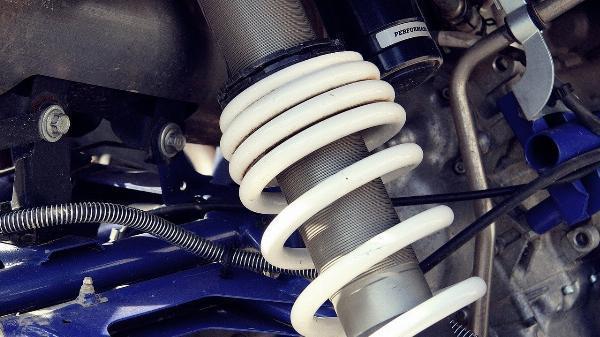Suspension Market Demands and Trends Projected Growth at 6.4% CAGR by 2028

Strong8k brings an ultra-HD IPTV experience to your living room and your pocket.
The Global Suspension Market has shown remarkable growth and resilience over the years. According to the TechSci Research report, “Global Suspension Market – Global Industry Size, Share, Trends, Competition Forecast & Opportunities, 2028”, the market stood at USD 129 billion in 2022 and is anticipated to grow at a Compound Annual Growth Rate (CAGR) of 6.4% during the forecast period from 2024 to 2028. This report delves into the various dimensions, dynamics, and trends driving the market, offering an in-depth understanding of its current state and future potential. The significance of suspension systems in vehicle performance, safety, and comfort underscores the importance of this market within the broader automotive industry.
Key Drivers of Suspension Market
Demand for Comfortable and Safe Transportation
One of the primary drivers of the Global Suspension Market is the increasing consumer demand for comfortable and safe transportation options. Modern vehicles are expected to provide a smooth and enjoyable ride experience, necessitating advanced suspension systems. These systems play a crucial role in enhancing vehicle performance and fuel efficiency, leading to a sustained demand for innovative suspension solutions. Furthermore, as urbanization and the middle class expand globally, more consumers can afford vehicles, amplifying the need for quality suspension systems that can navigate diverse road conditions and enhance passenger comfort.
Advancements in Suspension Technologies
Technological advancements in suspension systems have significantly contributed to market growth. Innovations such as adaptive and air suspension systems have improved ride quality, handling, and fuel efficiency. These advanced systems allow for customization and superior performance, making them highly desirable in the automotive sector. The integration of electronic control units (ECUs) in modern suspension systems enables real-time adjustments based on driving conditions, further enhancing the driving experience and vehicle safety. As autonomous and semi-autonomous vehicles become more prevalent, the demand for sophisticated suspension systems that can interact with other vehicle systems is expected to increase.
Rise of Electric Vehicles (EVs)
The growing popularity of electric vehicles (EVs) has created a unique demand for specialized suspension systems. EVs have distinct characteristics, such as battery weight distribution and regenerative braking, which require tailored suspension solutions. Manufacturers are focusing on developing systems specifically designed for EVs, further driving market expansion. The heavier battery packs in EVs necessitate suspension systems that can support additional weight without compromising performance. Additionally, the quiet operation of EVs highlights the importance of suspension systems in minimizing noise, vibration, and harshness (NVH), contributing to a more refined driving experience.
Browse over XX market data Figures spread through XX Pages and an in-depth TOC on "Global Suspension Market.” @ https://www.techsciresearch.com/report/global-suspension-market/2356.html
Vehicle Maintenance and Replacement Demand
The consistent need for vehicle maintenance and part replacement, including suspension components, ensures robust market demand. As vehicles age and accumulate mileage, their suspension systems require servicing or replacement to maintain optimal performance and safety. This ongoing demand for maintenance and replacements fuels the growth of the suspension market. In addition to routine wear and tear, advancements in diagnostic technologies enable proactive maintenance, identifying potential suspension issues before they become critical. This trend towards preventive maintenance further bolsters the aftermarket for suspension components, driving sustained demand.
Overview of Suspension Market
Types of Suspension Systems
Independent Suspensions
Independent suspension systems allow each wheel on the same axle to move independently, offering superior ride comfort and handling. These systems are commonly used in passenger cars and light trucks. Independent suspensions, such as MacPherson struts and double wishbone systems, enhance vehicle dynamics by reducing unsprung mass and improving tire contact with the road. This leads to better cornering capabilities and a smoother ride, making these systems popular in performance and luxury vehicles. The continued evolution of independent suspension designs aims to balance cost, complexity, and performance, making them accessible across various vehicle segments.
Dependent Suspensions
Dependent suspension systems have a solid axle that connects both wheels, making them move together. These systems are often found in heavy-duty vehicles like trucks and buses due to their robustness and load-carrying capacity. Dependent suspensions, such as leaf springs and solid axles, are known for their durability and simplicity, which makes them ideal for commercial applications. These systems provide consistent performance under heavy loads and rough terrain, ensuring vehicle stability and safety. Innovations in materials and design, such as the use of lightweight composites, are enhancing the performance of dependent suspensions, making them more efficient and durable.
Applications Across Vehicle Types
Passenger Cars
Passenger cars constitute a significant segment of the suspension market. The demand for advanced suspension systems in this category is driven by the need for enhanced ride comfort, handling, and safety. As consumers prioritize comfort and performance, manufacturers are integrating sophisticated suspension technologies to meet these expectations. The rise of electric and autonomous passenger cars further amplifies the need for advanced suspension systems that can handle unique operational demands while providing a smooth, comfortable ride.
Commercial Vehicles
Commercial vehicles, including trucks, buses, and vans, require durable and reliable suspension systems to handle heavy loads and ensure stability. The growth of the logistics and transportation industry further boosts demand in this segment. With the increasing emphasis on efficient and sustainable transportation, advanced suspension systems that improve fuel efficiency and reduce emissions are gaining traction. Moreover, the adoption of telematics and IoT technologies in commercial vehicles enhances suspension system monitoring and maintenance, ensuring optimal performance and reducing downtime.
SUVs and Crossovers
SUVs and crossovers are increasingly popular due to their versatility and performance. These vehicles require specialized suspension systems that can provide comfort on highways and robustness on off-road terrains. The popularity of SUVs and crossovers in urban and suburban markets underscores the need for suspension systems that balance comfort, handling, and off-road capability. Advanced suspension technologies, such as electronically controlled damping and adjustable ride height, are becoming standard features in this segment, enhancing both on-road and off-road driving experiences.
Download Free Sample Report @ https://www.techsciresearch.com/sample-report.aspx?cid=2356
Customers can also request 10% free customization on this report.
Advancements in Suspension Technology
Adaptive Suspension Systems
Adaptive suspension systems automatically adjust the damping characteristics based on road conditions and driving style. This technology enhances ride comfort and vehicle stability, making it a key trend in the market. Adaptive systems use sensors and actuators to provide real-time adjustments, offering a customizable driving experience that can adapt to various terrains and driving preferences. The integration of artificial intelligence and machine learning in adaptive suspensions is further enhancing their capability to predict and respond to road conditions, optimizing performance and safety.
Air Suspension Systems
Air suspension systems use airbags instead of traditional steel springs, allowing for adjustable ride height and improved ride quality. These systems are particularly popular in luxury vehicles and commercial trucks. Air suspensions offer the flexibility to adjust ride height based on load and driving conditions, improving aerodynamics, fuel efficiency, and vehicle accessibility. The continued development of more reliable and durable air suspension components is expanding their application beyond luxury and commercial vehicles, making them a viable option for a broader range of vehicle segments.
Dynamics for Suspension Market
Consumer Demand for Ride Comfort and Handling
Consumer expectations for superior ride comfort and precise handling are significant drivers of the suspension market. Modern vehicles must provide a smooth, comfortable ride while ensuring stability and control, prompting continuous innovation in suspension technologies. The integration of advanced suspension systems in vehicles enhances driver and passenger experience, contributing to brand differentiation and customer satisfaction. As competition in the automotive market intensifies, manufacturers are increasingly investing in suspension technologies to meet and exceed consumer expectations.
Stringent Safety Regulations
Governments worldwide are implementing stringent safety regulations that necessitate advanced safety features in vehicles. Suspension systems play a critical role in vehicle stability and safety, driving the demand for high-quality, reliable suspension components. Compliance with safety standards requires the integration of advanced technologies such as electronic stability control and active suspension systems. These technologies enhance vehicle control and reduce the risk of accidents, contributing to overall road safety. The continuous evolution of safety regulations ensures that the suspension market remains dynamic, with ongoing innovation and development to meet regulatory requirements.
Technological Innovations
Ongoing innovations in materials, design, and manufacturing processes are reshaping the suspension market. Technologies such as adaptive dampers, air suspensions, and advanced sensors are revolutionizing vehicle performance and ride comfort. The use of lightweight materials, such as high-strength steel and composites, is enhancing the efficiency and durability of suspension components. Advanced manufacturing techniques, including 3D printing and precision machining, are improving the quality and consistency of suspension systems. These innovations not only enhance vehicle performance but also contribute to sustainability by reducing weight and improving fuel efficiency.
Electric and Hybrid Vehicles
The shift towards electric and hybrid vehicles presents new challenges and opportunities for the suspension market. These vehicles require specialized suspension systems to accommodate unique characteristics such as battery weight distribution and regenerative braking. The development of suspension systems that optimize the performance and efficiency of electric and hybrid vehicles is critical to their adoption and success. Innovations such as active suspension systems, which can dynamically adjust to changing loads and driving conditions, are particularly relevant for these vehicles. The increasing focus on reducing emissions and improving fuel efficiency further drives the demand for advanced suspension systems in electric and hybrid vehicles.
Challenges and Opportunities
Lightweight and Durable Components
One of the key challenges faced by the industry is the need for lightweight and durable suspension components. Stringent regulatory requirements for fuel efficiency and emissions necessitate the development of advanced materials and designs. The use of lightweight materials, such as aluminum and carbon fiber, in suspension components helps reduce overall vehicle weight, enhancing fuel efficiency and performance. However, balancing weight reduction with durability and cost-effectiveness remains a challenge. Ongoing research and development efforts are focused on creating materials and designs that meet these requirements, offering significant opportunities for innovation and growth in the suspension market.
Supply Chain Optimization
Efficient supply chain management is crucial for the timely delivery of suspension components. The globalization of the automotive industry requires robust supply chain strategies to ensure the availability of high-quality parts. Challenges such as fluctuating raw material prices, geopolitical uncertainties, and logistical complexities can impact supply chain efficiency. Advanced technologies, such as blockchain and IoT, are being leveraged to enhance transparency, traceability, and efficiency in the supply chain. By optimizing supply chain operations, manufacturers can ensure the timely delivery of suspension components, reducing production delays and enhancing market competitiveness.
Emerging Markets
Emerging markets offer significant growth opportunities for the suspension market. Increasing vehicle production and sales in regions such as Asia-Pacific and Latin America are driving demand for advanced suspension systems. Economic growth, urbanization, and rising disposable incomes in these regions are boosting vehicle ownership and demand for high-quality automotive components. Manufacturers are expanding their presence in emerging markets to capitalize on these opportunities, investing in local production facilities and partnerships. Tailoring products to meet the specific needs and preferences of consumers in emerging markets is critical to success in these regions.
Sustainability Goals
The automotive industry is increasingly focused on sustainability, driving the development of eco-friendly suspension solutions. Manufacturers are investing in research and development to create sustainable and recyclable components. The use of environmentally friendly materials, such as recycled metals and bio-based polymers, is gaining traction in the production of suspension components. Additionally, the adoption of manufacturing processes that minimize waste and energy consumption contributes to sustainability goals. As consumers and regulators prioritize sustainability, the demand for green suspension solutions is expected to grow, presenting significant opportunities for innovation and market growth.
Major Players in the Suspension Market
Continental AG
Continental AG is a leading manufacturer of suspension systems, known for its innovative solutions and extensive product portfolio. The company focuses on developing advanced technologies to enhance ride comfort and vehicle performance. Continental's suspension systems are used in a wide range of vehicles, from passenger cars to commercial trucks, highlighting their versatility and reliability. The company's commitment to research and development ensures the continuous improvement of its products, positioning it as a key player in the global suspension market.
Mando Corporation
Mando Corporation is a key player in the suspension market, offering a wide range of products including shock absorbers, struts, and suspension modules. The company emphasizes research and development to meet evolving market demands. Mando's innovative suspension solutions are designed to enhance vehicle stability, handling, and comfort, making them highly desirable in the automotive industry. The company's global presence and extensive customer base underscore its significance in the suspension market.
ZF Friedrichshafen AG
ZF Friedrichshafen AG is a global leader in automotive suspension systems, known for its cutting-edge technologies and high-quality products. The company's extensive experience and expertise position it as a prominent player in the market. ZF's suspension systems are designed to improve vehicle dynamics, safety, and comfort, offering advanced solutions for a wide range of vehicles. The company's focus on innovation and sustainability ensures its continued growth and success in the suspension market.
Download Free Sample Report @ https://www.techsciresearch.com/sample-report.aspx?cid=2356
Customers can also request 10% free customization on this report.
Thyssenkrupp AG
Thyssenkrupp AG specializes in developing innovative suspension solutions that improve vehicle performance and safety. The company's focus on sustainability and advanced materials drives its growth in the market. Thyssenkrupp's suspension systems are used in a variety of vehicles, from passenger cars to heavy-duty trucks, highlighting their versatility and reliability. The company's commitment to research and development ensures the continuous improvement of its products, positioning it as a key player in the global suspension market.
Tenneco Inc.
Tenneco Inc. is a major supplier of suspension systems, offering a diverse range of products including shock absorbers, struts, and air suspension systems. The company's commitment to quality and innovation ensures its strong market presence. Tenneco's suspension solutions are designed to enhance vehicle performance, comfort, and safety, making them highly desirable in the automotive industry. The company's global presence and extensive customer base underscore its significance in the suspension market.
Marelli Corporation
Marelli Corporation is a key player in the global suspension market, known for its advanced technologies and comprehensive product offerings. The company focuses on enhancing vehicle performance and comfort through innovative suspension solutions. Marelli's suspension systems are used in a wide range of vehicles, from passenger cars to commercial trucks, highlighting their versatility and reliability. The company's commitment to research and development ensures the continuous improvement of its products, positioning it as a key player in the global suspension market.
Hyundai Mobis Co. Ltd
Hyundai Mobis Co. Ltd is a leading manufacturer of suspension systems, providing high-quality products for a wide range of vehicles. The company's emphasis on research and development drives its market growth. Hyundai Mobis' suspension solutions are designed to enhance vehicle stability, handling, and comfort, making them highly desirable in the automotive industry. The company's global presence and extensive customer base underscore its significance in the suspension market.
Hitachi Astemo Ltd
Hitachi Astemo Ltd is a prominent player in the suspension market, known for its advanced technologies and reliable products. The company's focus on innovation and quality ensures its strong market position. Hitachi Astemo's suspension systems are used in a variety of vehicles, from passenger cars to heavy-duty trucks, highlighting their versatility and reliability. The company's commitment to research and development ensures the continuous improvement of its products, positioning it as a key player in the global suspension market.
BWI Group
BWI Group specializes in developing high-performance suspension systems that enhance vehicle stability and ride comfort. The company's commitment to innovation and customer satisfaction drives its market growth. BWI's suspension solutions are designed to improve vehicle dynamics, safety, and comfort, offering advanced solutions for a wide range of vehicles. The company's global presence and extensive customer base underscore its significance in the suspension market.
Sogefi SpA
Sogefi SpA is a leading supplier of suspension components, known for its advanced technologies and high-quality products. The company's focus on sustainability and innovation positions it as a key player in the market. Sogefi's suspension systems are used in a variety of vehicles, from passenger cars to heavy-duty trucks, highlighting their versatility and reliability. The company's commitment to research and development ensures the continuous improvement of its products, positioning it as a key player in the global suspension market.
Conclusion
The Global Suspension Market is a dynamic and integral component of the automotive industry. Its growth is propelled by consumer demand for exceptional ride comfort, stringent regulatory standards, technological advancements, global vehicle production, sustainability goals, supply chain optimization, and the shift toward electric and hybrid vehicles. The suspension market's adaptability and responsiveness ensure that vehicles are equipped with reliable, efficient, and advanced suspension systems, meeting the demands of safety-conscious consumers and regulatory requirements in the ever-evolving automotive landscape.
In conclusion, the Global Suspension Market is poised for significant growth in the coming years. With continuous advancements in technology and increasing demand for superior ride quality and safety, the market offers substantial opportunities for industry stakeholders. By understanding the key drivers, challenges, and trends, businesses can make informed decisions and capitalize on the emerging opportunities in this dynamic and critical segment of the automotive industry. As the automotive industry continues to evolve, the suspension market will play a crucial role in shaping the future of vehicle performance, safety, and comfort.
You may also read:
Automotive Gears Market Exploring Size and Growth Trends USD 4.3 Billion Valuation
Automotive Heat Shield MarketInsights Share and Growth Trends (2028)
Balance Shaft Market Robust Growth Forecast Overview and Analysis
Note: IndiBlogHub features both user-submitted and editorial content. We do not verify third-party contributions. Read our Disclaimer and Privacy Policyfor details.



![Power Steering Fluids Market Forecast: [5.67%] CAGR Growth from 2022 to 2028](https://indibloghub.com/public/images/courses/67a584ee821799027_1738900718.png)


![Baselayer Compression Shirts Market: Key Insights on USD [320 Million] in [2022], [4.7% CAGR] Through [2028]](https://indibloghub.com/public/images/courses/67a055a4a9dbf1336_1738560932.png)
![Baseball Gloves Market: [5.3% CAGR] Growth Expected by [2028], Key Players Driving Trends](https://indibloghub.com/public/images/courses/67a05146b42d66899_1738559814.png)